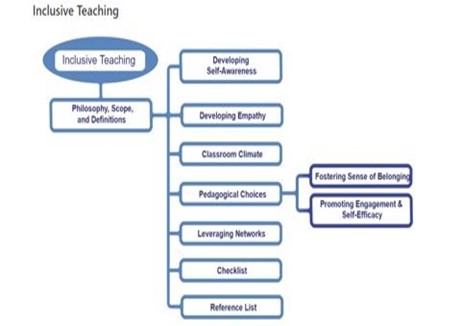
Written and curated by Saint Leo Faculty: Victoria Anyikwa, Ph.D. and Khalilah Caines, LCSW
What Is Inclusive Teaching?
Dewsbury & Brame (2019) define inclusion within education as “the degree to which the classroom physical environment and the interactions that occur as a function of the course, produce is welcoming and provides opportunities for success for all identities”. This definition highlights the importance of the environment and relationships within the classroom that impact student learning. However, as educators, it is also important to consider the contexts in which our students live, work, and play, which may also impact the teaching and learning process. Inclusivity is “the practice of including people across differences. Inclusivity implies an intentional practice of recognizing and working to mitigate biases that lead to marginalization or exclusion of some people” (Drewsbury & & Brame, 2019).
Inclusive teaching approaches take into consideration contextual factors both within the classroom and outside of the classroom that can influence the teaching and learning process. Being an inclusive educator requires reflection on an instructor’s own beliefs and approaches to teaching diverse students and social identities.
Inclusive Online Teaching
Inclusive Teaching online intentionally attends to and ensures that.
“the different identities that are brought into the shared space–be it physical or virtual– are respected, addressed, incorporated, and celebrated. It focuses on facilitating the space needed for learning to be multi-dimensional, intentional, and critical. Inclusive teaching makes students feel seen and heard and allows them to think more critically about their interactions with each other and with faculty. It has multiple focus areas, including accessibility, bias awareness, and incorporating marginalized and underrepresented voices in conversations and curricula.” – Haya Ghandour, Sophomore, SEAS; Undergraduate Student Consultant, CTL Students as Pedagogical Partners (SAPP) Initiative. Inclusive Teaching and Learning Online (columbia.edu)
Resources
Evidence-Based Teaching Guide– Used with Permission Dewsbury and Brame (2019) Can be accessed at: https://lse.ascb.org/evidence-based-teaching-guides/inclusive-teaching

A RESOURCE FOR INSTRUCTORS AND EDUCATIONAL DEVELOPERS (inclusiveteachingvisualization.com)
Thoughts and Experiences with Inclusive Teaching and Learning Online (columbia.edu)
Small changes can make college teaching more inclusive (opinion) (insidehighered.com)
Creating an Inclusive Classroom for a Diverse Student Group | Faculty Focus
Teaching & Learning – UCL – University College London
Video Resources
The power of inclusive education | Ilene Schwartz | TEDxEastsidePrep
Diversity, Equity, and Inclusion – YouTube
Simple Questions with Complex Answers: Inclusion in HE | Sylvan Baker | TEDxRoyalCentralSchool
